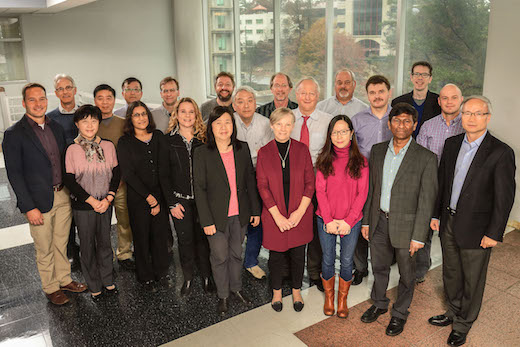Emory’s Department of Pharmacology is changing its name. Effective January 1, 2019, its name will be “Department of Pharmacology and Chemical Biology.”
Pharmacology and Chemical Biology faculty have been discussing the planned name change with their colleagues across the university since 2017. The change reflects a broadening of vision: from fundamental science of drugs to tools (chemical probes) targeted to disease-related proteins. Traditional pharmacology examines drugs’ mechanism of action, while chemical biology is oriented toward dissecting the machinery of life using chemical probes, says department chair Haian Fu, PhD.
“If we define pharmacology as the use of chemistry to modulate biology for medical purposes, then ‘chemical biology’ is a more general term, including the exploitation of the chemistry-biology interface to provide insights into biology’s most fundamental aspects,” Fu says. Such insights will in turn help our better understanding of human diseases and making better medicines.
Pharmacology and Chemical Biology sees itself as an “interface department”, connecting basic discovery and clinical advances, he says. The name change harmonizes with related initiatives, such as the recruitment of new faculty with envisioned interface roles, and cross-campus educational and therapeutic innovation activities.
Incorporating “Chemical biology” also has the support of chemistry faculty, and aligns the renamed department with the Departments of Chemistry and Biology within Emory College of Arts & Sciences.
Chemical biology has been well-established at Emory for some time. The Emory Chemical Biology Discovery Center, created in 2003, works with both Emory investigators and outside researchers to enable chemical probe discovery. The Center harnesses robots that can sift through vast libraries of compounds, accelerating high throughput screening for chemical probe and drug discovery.
Yet chemical biology extends beyond robotic drug discovery. For example, researchers can use chemical probes to freeze rapid biological processes in place, or to map transient interactions within or outside cells. One such effort, spearheaded by Ray Dingledine, Thota Ganesh and Yuhong Du of the Department of Pharmacology and Chemical Biology, led to discovery of a novel class of chemical probes that were used to reveal an unsuspected role for the EP2 receptor in brain inflammation. These chemicals are now being developed to quell inflammation for epilepsy, brain injury and Alzheimer’s disease.
Another recent example of a chemical biology-oriented collaboration was an investigation of cancer cell growth drivers, involving scientists from the Department of Pediatrics. Researchers led by Muxiang Zhou, MD identified compounds that stopped two anticancer targets, MDM2 protein and XIAP RNA, from working together.
“This is more than just a name change,” says Vikas Sukhatme, MD, ScD, dean of the Emory University School of Medicine. “It reflects pharmacology and chemical biology’s capabilities as discovery engines connecting the medical school and university. I anticipate it will help us advance recruitment and build interdisciplinary programs.”

